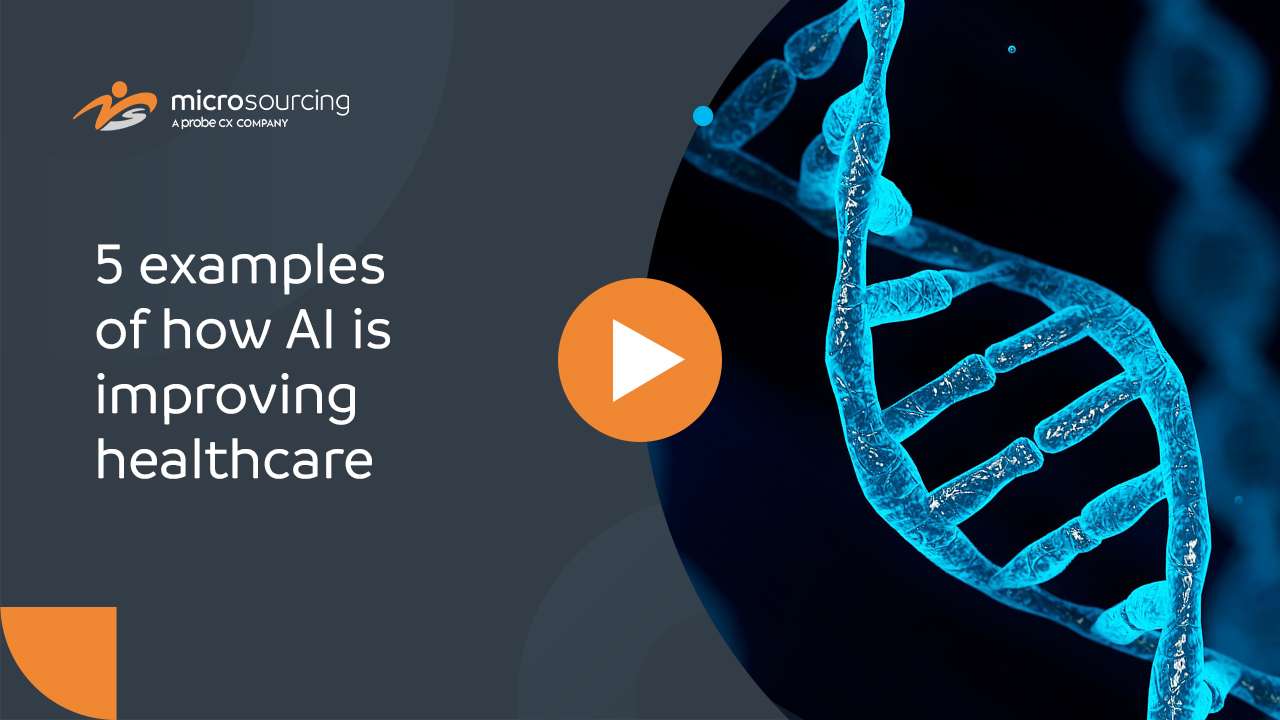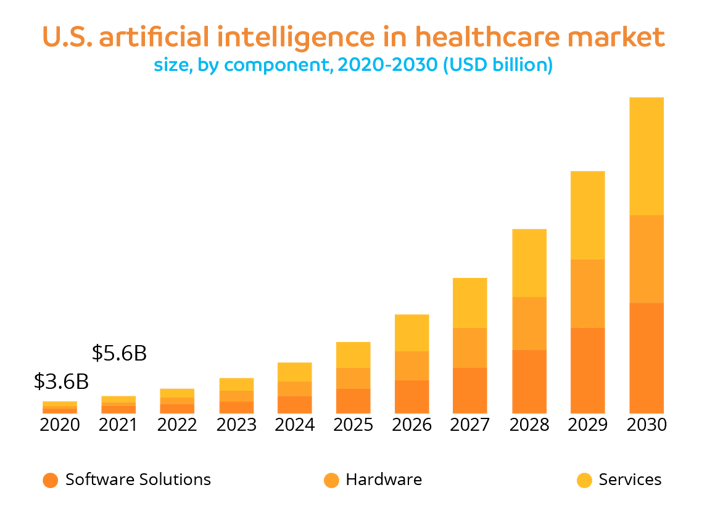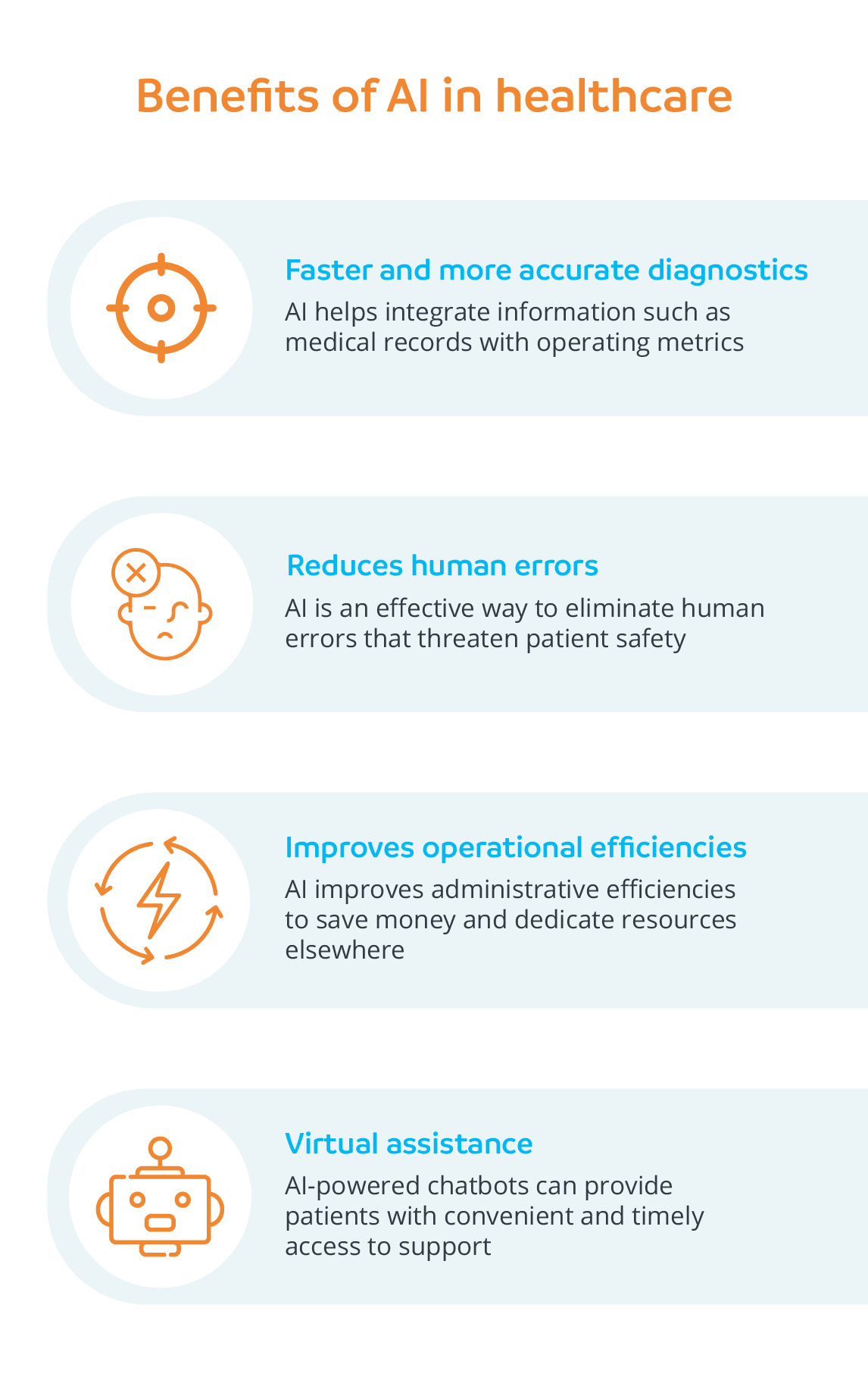5 examples of how AI is improving healthcare
The World Economic Forum prides itself on its independence. In its own words: “It is impartial and not tied to any special interests … moral and intellectual integrity is at the heart of everything it does.”1 As an international organization for public-private cooperation, it simply aims to bring people together who have the drive and influence to make positive change.

For that reason, the release of a World Economic Forum report makes people sit up and take notice and so it was in mid-2023 when the organization turned its attention to artificial intelligence (AI) in healthcare. On the back of critical challenges such as a shortage of frontline workers, health disparities and escalating spending2, the report’s authors analyzed more than 400 existing AI use cases and conducted in-depth interviews with 50 global leaders across fields such as technology, healthcare delivery and government.
And what did they find? AI has the power to tackle the issues keeping healthcare executives awake at night.
“The question is no longer whether the technology exists for AI to transform healthcare. It does,” report collaborator Pratap Khedkar said3. “If adopted broadly and responsibly, AI holds the potential to radically transform systems and improve healthcare outcomes for all.”
AI has already seen modern hospitals and healthcare practices become places where patient care has never been more sophisticated. Computer vision tools can detect suspicious skin lesions as well as a specialist dermatologist4. Data-driven robots can guide minimally invasive surgery5. Machine learning has been applied to detect Alzheimer’s disease6 and help choose the best medication for patients with major depression7.

With AI reshaping the way clinicians diagnose, treat and monitor patients, it has never been more important for healthcare leaders to be abreast of its growing impact on the sector, key benefits and examples of the technology in action.

What is AI in healthcare?
Artificial intelligence in healthcare is the use of AI-enabled tools such as machine learning, natural language processing and deep learning to assist and ideally improve the patient experience. This can range from analyzing vast volumes of raw medical information to create more accurate diagnoses to identifying problems and recommending solutions across clinical and administrative environments. With an estimated worth of $14.6 billion in 2023, the global healthcare AI market is forecast to increase to $102.7 billion by 20288.
Benefits of AI in healthcare
Artificial intelligence in healthcare has grown in its capabilities to deliver a range of benefits.
- Improved diagnosis and treatment: patient care lies at the core of any health organization and AI is playing a critical role in enhancing the accuracy and speed of diagnoses. With AI algorithms able to analyze vast amounts of patient data including medical records, imaging scans and genetic information, the technology can identify patterns, detect anomalies and provide insights that may be missed by human clinicians. This also means an increased chance of early detection and, in turn, personalized treatment plans.
- Improved efficiencies: given rising cost pressures, many healthcare providers are keen to streamline processes and AI technologies are a sure-fire way to do just that. AI-powered systems can automate routine administrative tasks such as patient scheduling, billing and documentation, thus freeing up employees’ time to focus on more valuable work. Optimizing hospital workflows and patient flow is another capability, which collectively lead to reduced wait times and improved resource allocation.
- Predictive analytics: they say prevention is better than a cure and AI is changing the game by leveraging predictive analytics to identify people at higher risk of developing certain conditions or diseases. By analyzing large datasets, AI algorithms can predict at-risk patients and enable hospitals and health providers to implement proactive measures such as target screenings and early interventions. This switch from reactive to proactive care not only empowers people to take charge of their health but enables healthcare systems to allocate resources and funds more effectively.

5 great AI in healthcare examples
AI is becoming increasingly sophisticated, with many examples of how the technology is transforming the healthcare environment.
- Medical imaging: diagnostic tools such as X-rays, CT scans and MRIs have long been utilized by clinicians but AI algorithms are now changing the game when it comes to the speed and accuracy of analyzing such medical images. For example, AI can detect patterns and abnormalities in images to aid in the detection of cancer, tumors and other abnormalities.
- Electronic health records management: record-keeping is an essential and time-consuming part of healthcare but AI is helping overburdened clinicians and administrative staff manage the load. By extracting valuable information from vast amounts of patient data, AI solutions can identify trends, highlight risks and help make accurate and timely clinical decisions.
- Virtual assistants and chatbots: in a world where people not only want but expect timely access to information, AI-powered virtual assistants and chatbots are providing patients with fast and accurate access to basic medical information and support. More advanced tools can also help triage patients and provide initial assessments, thus saving costs and ensuring better allocation of human resources.
- Wearable devices: remote monitoring is fast becoming a foundation of modern healthcare, with AI-enabled wearable technology allowing healthcare providers to track and analyze patient data in real-time. Along with detecting anomalies and predicting health deterioration, such devices can ensure timely interventions that reduce the need for hospital visits.
- Drug development: history is littered with examples of how medicine has changed the world for the better and AI is now accelerating the drug discovery and development process. By analyzing biomedical data, scientific literature and clinical trial results, AI is identifying and predicting the efficacy of drug candidates and, in turn, reducing the time and cost needed to bring them to market.
Privacy and ethical concerns for AI in healthcare
There is much to like about the use of AI in healthcare but hospital and health providers need to be mindful that the smallest of mistakes can create the greatest of headaches. With AI relying heavily on access to medical records, genetic information and personal health data, ensuring the privacy and security of such material is crucial to protect confidentiality. Robust data protection, encryption and secure data storage need to be part of any AI in healthcare conversation.
From an ethical standpoint, it is equally essential to obtain informed consent from patients and ensure transparency regarding how their data will be used. Similarly, they should be clearly informed who will have access to their personal medical information and for what purposes. Ultimately, people should have the right to control the use and sharing of their health data, with the onus on health practices to maintain clear policies and procedures regarding its use.
Summary
Innovation has already made a lasting impact on the healthcare sector but as artificial intelligence continues to evolve, the best is yet to come. In a world that is more digitally connected than ever, the adoption of AI in healthcare is no longer a luxury but a must for hospitals and providers that want to improve outcomes and deliver better patient experiences.
Amid challenging conditions, it is little wonder an increasing number of hospital and healthcare executives are looking to healthcare outsourcing. Discover five benefits of outsourcing your healthcare services to the Philippines.
Reference:
[1] Our Mission | World Economic Forum (weforum.org)
[2] Scaling Smart Solutions with AI in Health: Unlocking Impact on High potential use cases | World Economic Forum (weforum.org)
[3] Top AI Applications to Revolutionize Global Healthcare: World Economic Forum | Mirage News
[4] Using deep learning for dermatologist-level detection of suspicious pigmented skin lesions from wide-field images | Science Translational Medicine
[5] Robot-Assisted Minimally Invasive Surgery—Surgical Robotics in the Data Age | IEEE Journals & Magazine | IEEE Xplore
[6] Using Multi-Scale Genetic, Neuroimaging and Clinical Data for Predicting Alzheimer’s Disease and Reconstruction of Relevant Biological Mechanisms | Scientific Reports (nature.com)
[7] Frontiers | A Deep Learning Approach for Predicting Antidepressant Response in Major Depression Using Clinical and Genetic Biomarkers (frontiersin.org)
[8] AI in healthcare market size worldwide 2030 | Statista
Popular posts
Browse by topic
- Accounting
- Accounting & Finance
- All Industries
- Banking
- BPO/RPO/HRO
- Communication
- CSR & ESG
- Customer & Client Acquisition
- Customer Experience
- Cybersecurity
- Cybersecurity & Compliance
- Data Management
- Digital Operations
- Digital Transformation
- eCommerce
- Education
- Employee Engagement
- Engineering & Construction
- Financial Services
- Healthcare
- Hospitality and tourism
- HR & Recruitment
- Information Technology
- Insurance
- Legal Services
- Logistics
- Offshoring & Outsourcing
- Outsourcing
- Professional Services
- Real Estate
- Retail & eCommerce
- Startups
- Talent Acquisition and Retention
- Technology
- Trends & Guides
- Workforce Integration
Related Posts
How employers can reduce healthcare costs
A lot has been written about how the working world has changed in the wake of the COVID-19 pandemic. Where many managers once linked productivity..
Finding value in partnerships: evaluating offshore providers for healthcare cost management
Academic journal The Conversation did not hold its punches when it recently turned its attention to a crisis engulfing the healthcare sector. Beneath..
How to improve patient experience in healthcare
It says a lot about the economic realities of modern-day health care that one of America’s most prestigious learning institutions has a course..
